Recognizing the Signs of Hearing Loss
Hearing loss can develop gradually or suddenly, and recognizing the early signs is key to addressing it effectively. Some common indicators include difficulty understanding conversations, frequently asking others to repeat themselves, or increasing the volume on electronic devices beyond what others find comfortable. If you or someone close to you experiences these symptoms, it may be time to schedule a hearing test with a certified audiologist.
It’s important not to ignore hearing loss, even if it seems minor. Untreated hearing issues can lead to social isolation, communication difficulties, and cognitive decline over time. If you begin to notice changes in your hearing, taking early action can lead to better outcomes and quality of life. A professional hearing evaluation will help determine the extent of your hearing loss and whether hearing aids are recommended.
Here are a few early signs that warrant a hearing evaluation:
- Trouble hearing in noisy environments
- Frequently misunderstanding words
- Needing to turn up the TV volume repeatedly
- Ringing or buzzing in the ears (tinnitus)
When to Consider Wearing Hearing Aids
Once hearing loss is confirmed, many people wonder when it’s appropriate to begin wearing hearing aids. The answer depends on the severity and impact of the hearing loss on daily life. If the hearing loss interferes with communication, work, or social interactions, hearing aids can be a practical and beneficial tool.
Even mild hearing loss can benefit from amplification, particularly in environments with background noise. Waiting too long to use hearing aids might make it harder to adjust when the need becomes more pronounced. Early use also trains the brain to process sounds more effectively, potentially slowing further auditory decline.
Situations where hearing aids may be especially helpful include:
- Group conversations or meetings
- Listening to music or television
- Talking on the phone
- Spending time in noisy public places
Ultimately, the decision should be guided by a hearing care professional who can match your hearing profile with appropriate solutions.
How to Choose the Right Hearing Aids
Choosing hearing aids involves more than just selecting a device off the shelf. There are various styles, technologies, and features to consider, and the right choice depends on your lifestyle, hearing needs, and budget. Some models are nearly invisible, sitting deep in the ear canal, while others are more visible but offer advanced features such as directional microphones and Bluetooth connectivity.
Important factors to consider when selecting hearing aids include:
- Degree of hearing loss
- Comfort and fit
- Battery life or rechargeable options
- Compatibility with smartphones or other devices
- Environmental settings and noise reduction features
Be sure to consult with a licensed hearing specialist who can provide a hearing test and recommend devices that suit your needs. Many providers also offer trial periods, allowing you to evaluate how well the hearing aids work before making a final decision.
Are Cheap Hearing Aids Worth Buying?
With the rise of over-the-counter and online hearing devices, many people are tempted by lower-cost options. While these devices can be appealing, it’s essential to approach them with caution. Cheap hearing aids may lack customization, proper fitting, and professional support, which are all crucial for effective hearing improvement.
Some inexpensive models may work for very mild hearing loss or occasional use, but they often fall short for those with moderate to severe hearing impairments. Furthermore, poorly made devices can cause discomfort, feedback noise, or even damage to the ear canal if not properly fitted. It’s also common for budget models to have limited features and durability.
Before purchasing, weigh the pros and cons carefully:
- Pros: Affordable, accessible, simple to use
- Cons: Limited effectiveness, no professional fitting, minimal features
In most cases, investing in hearing aids through a certified provider ensures better long-term satisfaction, even if the initial cost is higher. Many clinics also offer financing or insurance options to ease the financial burden.
Where to Buy Hearing Aids and What to Expect
Hearing aids can be purchased through several channels, but the most reliable option is through a licensed hearing care professional or clinic. These providers offer comprehensive services, including hearing evaluations, personalized fittings, and ongoing support. Some pharmacies and retail stores also offer hearing aids, often at lower prices, but the level of customization and professional care may be limited.
Online retailers have become increasingly popular, offering a wide range of hearing aids at various price points. However, it’s crucial to ensure that the seller is reputable and offers a clear return policy, customer support, and product warranty. When ordering online, be cautious of deals that seem too good to be true, and look for reviews from verified customers.
When buying hearing aids, expect the following steps:
- Initial hearing assessment
- Discussion of lifestyle and communication needs
- Selection and fitting of the hearing aid
- Trial period and adjustments
- Regular follow-up care and maintenance
Choosing a reliable source ensures that you’re not only getting a quality product but also the necessary support to adapt to your new hearing experience.
Conclusion: Making Informed Decisions About Hearing Health
If you’re experiencing signs of hearing loss, taking action early can make a significant difference in your communication, relationships, and overall well-being. Hearing aids are a valuable tool, but their effectiveness depends on proper diagnosis, selection, and maintenance. While low-cost options may seem convenient, they often lack the personalized features and support that many users need. Consulting with a qualified hearing care provider is the best way to ensure you get a solution tailored to your unique hearing profile and lifestyle. Whether you’re exploring hearing aids for the first time or considering an upgrade, being informed helps you make confident decisions about your hearing health.






